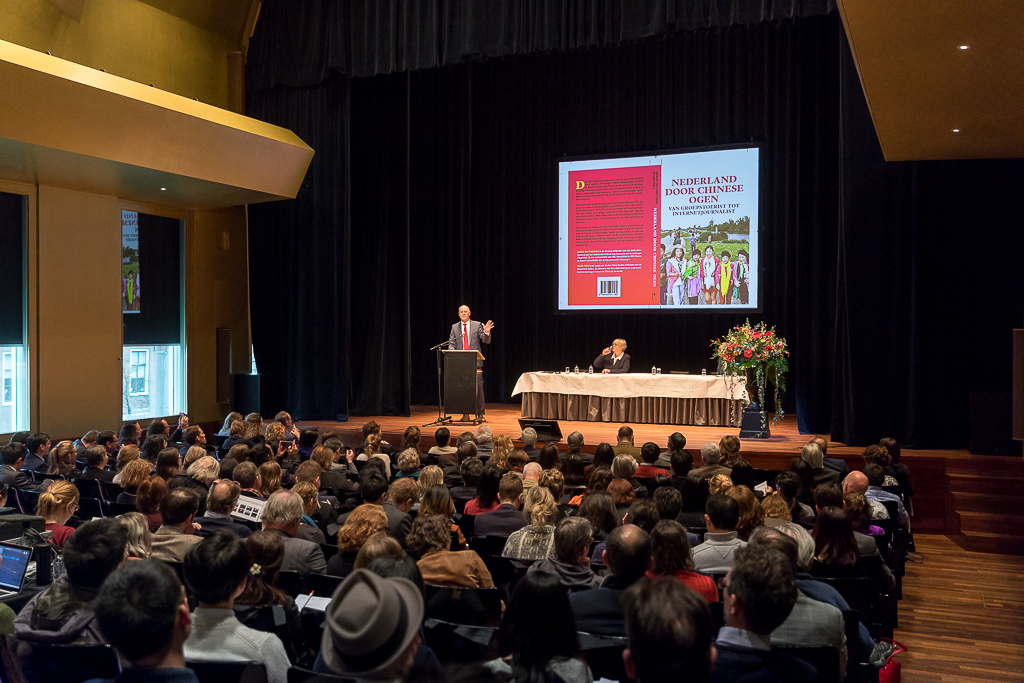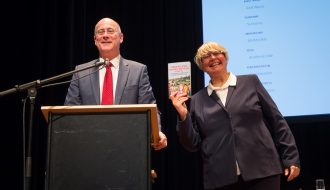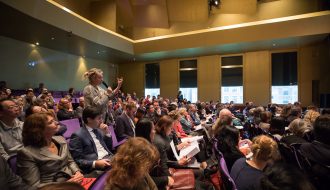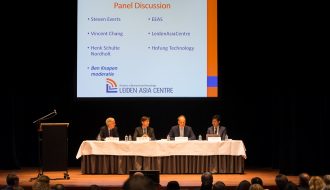Verslag Conferentie: “China, the Netherlands and Europe” 9 Februari

Hoe kijken Chinezen eigenlijk naar Nederland, en wat zijn hun ervaringen hier? Deze en meer onderwerpen werden 9 februari besproken op de conferentie: “China, the Netherlands and Europe” die plaatsvond in de Stadsgehoorzaal te Leiden. De conferentie, georganiseerd door het LeidenAsiaCentre, was tevens de opening van het Leiden Asia Year; het jaar waarin de Universiteit Leiden in het teken van Azië staat.
Centraal tijdens de bijeenkomsten stonden vier onderzoeksrapporten: Chinese bedrijven in Nederland, Chinese studenten in Nederland, Nederland in de Chinese (sociale) media en de perceptie van Nederlands-Chinese diplomatieke betrekkingen onder Chinese, Nederlandse en Europese diplomaten. De aan het LeidenAsiaCentre verbonden onderzoekers hadden de uitgangspunten al in een vroeg stadium voorgelegd aan de maatschappelijke partners en de uitkomsten waren met deze groep in november al besproken. Het middaggedeelte van de conferentie was bedoeld om de rapporten met een grotere kring deelnemers tegen het licht te houden.
De conferentie werd geopend met een introductie over het LeidenAsiaCentre en het Leiden Asia Year door academisch directeur Kasia Cwiertka. Zij lichte aan de hand van de website van het Leiden Asia Year de diversiteit toe van de 150 projecten die in dit jaar zullen plaatsvinden. Verder vertelde zij over de verschillende projecten en activiteiten die het LeidenAsiaCentre sinds haar oprichting in januari 2016 heeft georganiseerd en blikte tevens vooruit naar toekomstige projecten, zoals de continuering van het veelbesproken “Slaves of the System” project die de dwangarbeid van Noord-Koreanen in de Europese Unie aan het licht bracht.

Frank Pieke en Garrie van Pinxteren
Vervolgens presenteerden Frank Pieke en Garrie van Pinxteren hun boek “Nederland door Chinese ogen”, waarin de bovengenoemde wetenschappelijke rapporten zijn bewerkt tot een analyse van de ervaringen die Chinese studenten, bedrijven en journalisten tijdens hun verblijf in Nederland hebben opgedaan.
Dat het echt belangrijk is om China goed te (leren) begrijpen werd duidelijk in de toespraak van de Britse auteur en key-note spreker Martin Jacques. Met als titel: “A frozen Europe and a fast-changing China” besprak hij de opkomst en veranderende internationale positie van China, en hoe zich dit vertaalt in de relatie met Europa. Hij wees erop dat Europa er groot belang bij heeft om China niet meer met Westerse ogen te bekijken, maar dat we China enkel kunnen begrijpen aan de hand van haar eigen geschiedenis en cultuur. Alleen dan zijn er kansen voor Europa om relevant te blijven in de mondiale economie waarvan het centrum steeds meer in Azië zal liggen.
Het middagdeel begon met break-out sessies die dieper ingingen op de rapporten. De discussie met de deelnemers was o.a. bedoeld om te zien welke aanvullingen gedaan konden worden op de aanbevelingen van de onderzoekers.

De break-out sessie over Chinese bedrijven in Nederland werd gepresenteerd door een van de onderzoekers; Tianmu Hong, waarna het panel bestaande uit Alex Niatsetski (Asian Investment and Infrastructure Bank/ Ministerie van Financiën) en Frans-Paul van der Putten (Clingendael) dieper inging op de (geo)politieke gevolgen van de groeiende economische verbintenis tussen Nederland en China. Het bleek dat veel van de aanwezige Chinezen deze groeiende verbintenis als iets positiefs zien, terwijl in Nederland vooral de mogelijke politieke bijbedoelingen benadrukt worden.
Frank Pieke opende de break-out sessie over Chinese studenten in Nederland, met Ingrid d’Hooghe (China Relations/ Clingendael) en Sabine Amft (EP-Nuffic) als panel, en presenteerde de resultaten van het onderzoek naar Chinese studenten in Nederland. Wat volgde was een interactieve sessie waaruit bleek dat veel onderwijsinstellingen dezelfde ervaringen delen. Ook bleek dat het rapport op een uiterst opportuun moment verschijnt, omdat de Nederlandse overheid zich juist op dit moment aspecten van de internationaliseringsstrategie van het hoger onderwijs bezint.
De onderzoekers Garrie van Pinxteren en Bei Wang lichtten in de break-out sessie aangaande de beeldvorming van Nederland in de Chinese media hun bevindingen toe. De discussie werd geopend door de discussanten Tabitha Speelman (Trouw) en Ardi Bouwers (China Circle). De sessie ging dieper in op de grote ontwikkelingen van de Chinese (sociale) media, bijvoorbeeld hoe kritische signalen langzamerhand aan het verdwijnen zijn, en de subtiele invloed die Chinese correspondenten in Europa in de Chinese media kunnen uitoefenen.

Ben Knapen, Steven Everts, Henk Schulte Norholt en Vincent Chang
De conferentie werd afgesloten door een plenaire discussie met Steven Everts (EEAS), Henk Schulte Nordholt (Hofung Technology) en Vincent Chang (Fellow bij het LeidenAsiaCentre); gemodereerd door senator Ben Knapen (CDA). De panelleden bespraken vanuit hun werkveld hun visie op de relatie tussen China, Nederland en Europa, waarna ze in discussie gingen met elkaar en de zaal over het onderwerp. Het bleek dat zowel binnen de Nederlandse regering als de EU de noodzaak erkend wordt om de relaties met China te herijken nu China versneld een leidende rol in de wereld op zich lijkt te (moeten) nemen. Het is echter nog onduidelijk hoe deze nieuwe realiteit gerijmd kan worden met het vasthouden aan de kritiek op China aangaande het gebrek aan mensenrechten, de rechtsstaat en de nog steeds onvolledige toegang van buitenlandse bedrijven op de Chinese markt.
Frank Pieke, uitvoerend directeur van het LeidenAsiaCentre, concludeerde in zijn slotwoord dat de opzet van het centrum, met als uitgangspunt de samenwerking tussen het maatschappelijke veld en de academische wereld, ook daadwerkelijk goed werkt en zodoende kan leiden tot toepasbare en maatschappelijk relevante resultaten. Hetgeen deze conferentie goed bewezen heeft.[:en]
How do the Chinese view the Netherlands, and what do they experience here? These and other matters were discussed February 9th at the conference: “China, the Netherlands and Europe” which took place in Leiden. The conference, organized by the LeidenAsiaCentre, also marked the opening of the Leiden Asia Year; the year in which the municipality, the museums and University of Leiden dedicate the majority of their programs to Asia.
The focus during the gathering was on four research reports of the LeidenAsiaCentre: Chinese companies in the Netherlands, Chinese students in the Netherlands, the Netherlands in Chinese (social) media and the perception of Dutch-Chinese diplomatic relations among Chinese, Dutch and European diplomats. The researchers ,who are affiliated with the LeidenAsiaCentre, had at an early stage presented their findings to the societal partners and the results had been reviewed with this group already in November. The afternoon session of the conference was meant to discuss these reports with a bigger group of participants.
The conference was opened with an introduction of the LeidenAsiaCentre and the Leiden Asia Year by academic director Kasia Cwiertka. Using the website of the Leiden Asia Year, she illuminated the diversity of the 150 projects which will take place in this year. Additionally, she spoke about the several projects and activities undertaken by the LeidenAsiaCentre since its founding in January 2016 and gave a preview of future projects, like the continuation of the “Slaves of the System” project that had revealed the slave labor of North-Koreans in the European Union.

Frank Pieke and Garrie van Pinxteren
Subsequently , Frank Pieke and Garrie van Pinxteren presented their book: “The Netherlands through Chinese Eyes “ (in Dutch) in which the afore mentioned academic reports are digested into an analysis of the impressions and opinions Chinese students, companies and journalists had during their stay in the Netherlands.
That it is crucial to learn to understand China became clear in the presentation of British author and key-note speaker Martin Jacques. With the title: “A frozen Europe and a fast-changing China” he discussed the rise and changing international position of China, and how this concerns the country’s relation with Europe. He pointed at the fact that it is very important that Europe refrains from looking at China from a solely western viewpoint, because China can only be understood through its own history and culture. Only then does Europe have a chance to remain relevant in the global economy of which the center of gravity is shifting ever more to the east.
The afternoon session started with break-out sessions which closely examined the reports. The discussion with participants was meant to find out which additions can be made to the recommendations of the researchers.
The break-out session on Chinese companies in the Netherlands was presented by one of the researches: Tianmu Hong, and commented on by a panel consisting of Alex Niatsetsk (Asian Investment and Infrastructure Bank/Dutch Ministry of Finance) and Frans-Paul van der Putten (Clingendael). They further discussed the (geo)political implications of the increasing economic ties between China and the Netherlands. It became clear that many Chinese in the audience regarded this development as a positive thing, while in the Netherlands the possible political implications are often emphasized.

Frank Pieke opened the break-out session about Chinese students in the Netherlands, with Ingrid d’Hooghe (China Relations/ Clingendael) and Sabine Amft (EP-Nuffic) as panellists, and presented the results of the research on the growing number of Chinese students in the Netherlands. This was followed by an interactive session from which emerged that many educational institutions share the same experiences. It also turned out that the report is published at a critical moment, because the Dutch government is currently re-thinking aspects of the internationalization strategy in higher education.
Researchers Garrie van Pinxteren and Bei Wang introduced their findings in the break-out session on imaging of the Netherlands in the Chinese media. The discussion was opened by Tabitha Speelman (Trouw) and Ardi Brouwers (China Circle). The session revolved around the developments in the Chinese (social) media, for example how critical voices are slowly disappearing and the subtle influence that Chinese correspondents in Europe can practice in the Chinese media.

Ben Knapen, Steven Everts, Henk Schulte Norholt and Vincent Chang
The conference was concluded by a plenary discussion with Steven Everts (EES). Henk Schulte Nordholt (Hofung Technology) and Vincent Chang (Fellow at the LeidenAsiaCentre); moderated by senator Ben Knapen (CDA). The panel members addressed from their respective fields their vision on the relations between China, the Netherlands and Europe, after which a discussion started between them and the participants. It appeared that both within the Dutch government as well as in the EU the importance to strengthen relations with China is recognized now China is rapidly taking up a leading role in the world. However, it is still unclear how this new reality can be conformed with current criticism on China concerning the lack of human rights, the rule of law and the restriction on the entry of foreign companies onto the Chinese market.
Frank Pieke, executive director of the LeidenAsiaCentre, remarked in his concluding speech that the method of the center, which focusses on the collaboration between society and the academic world, works really well and can lead to applicable and relevant results. Something which this conference has certainly proved.[:]

